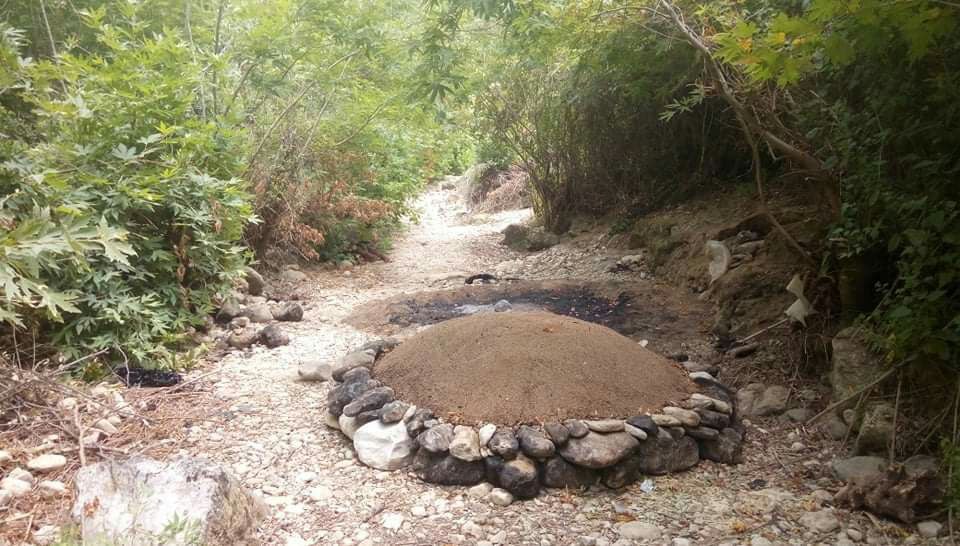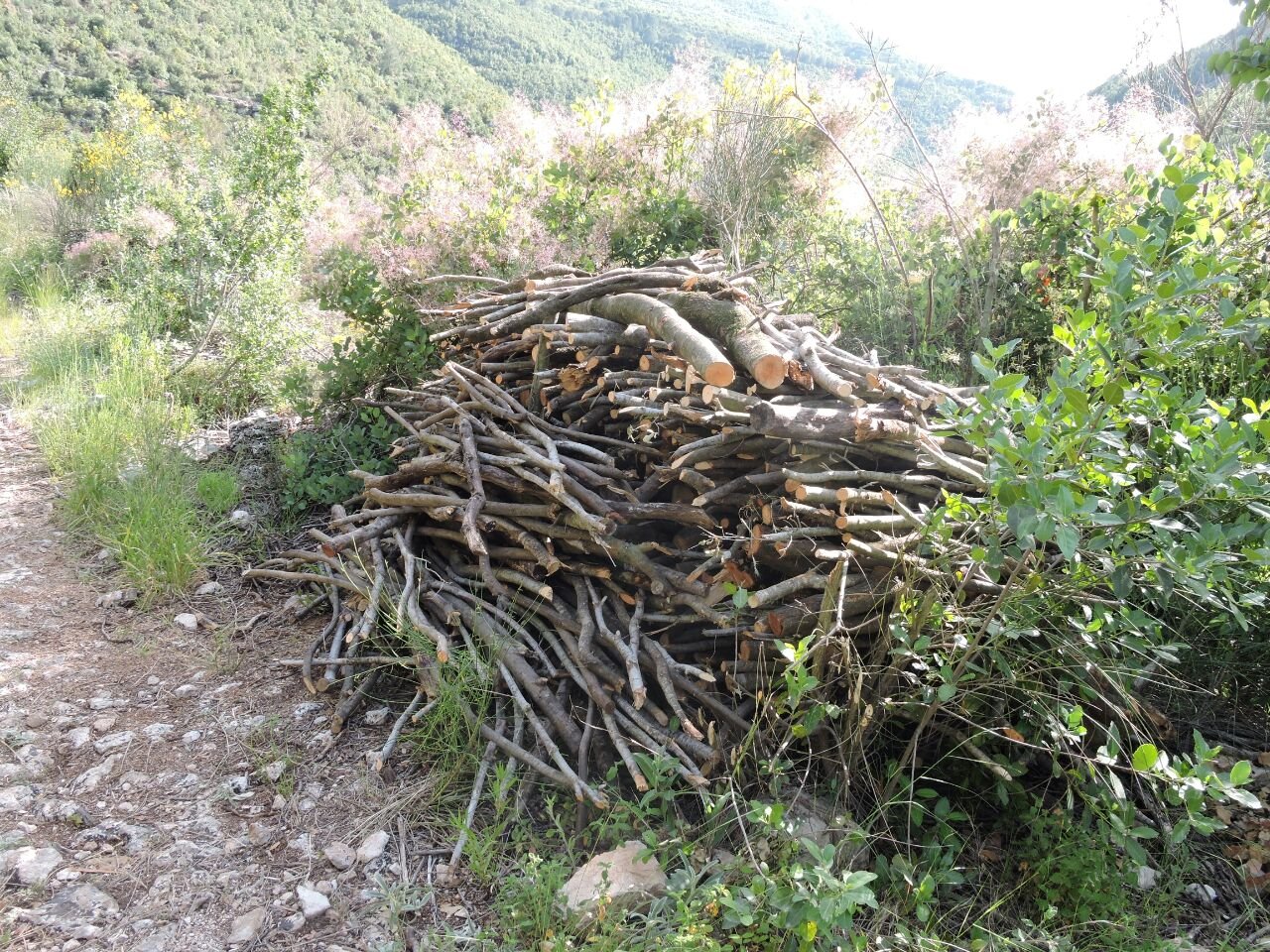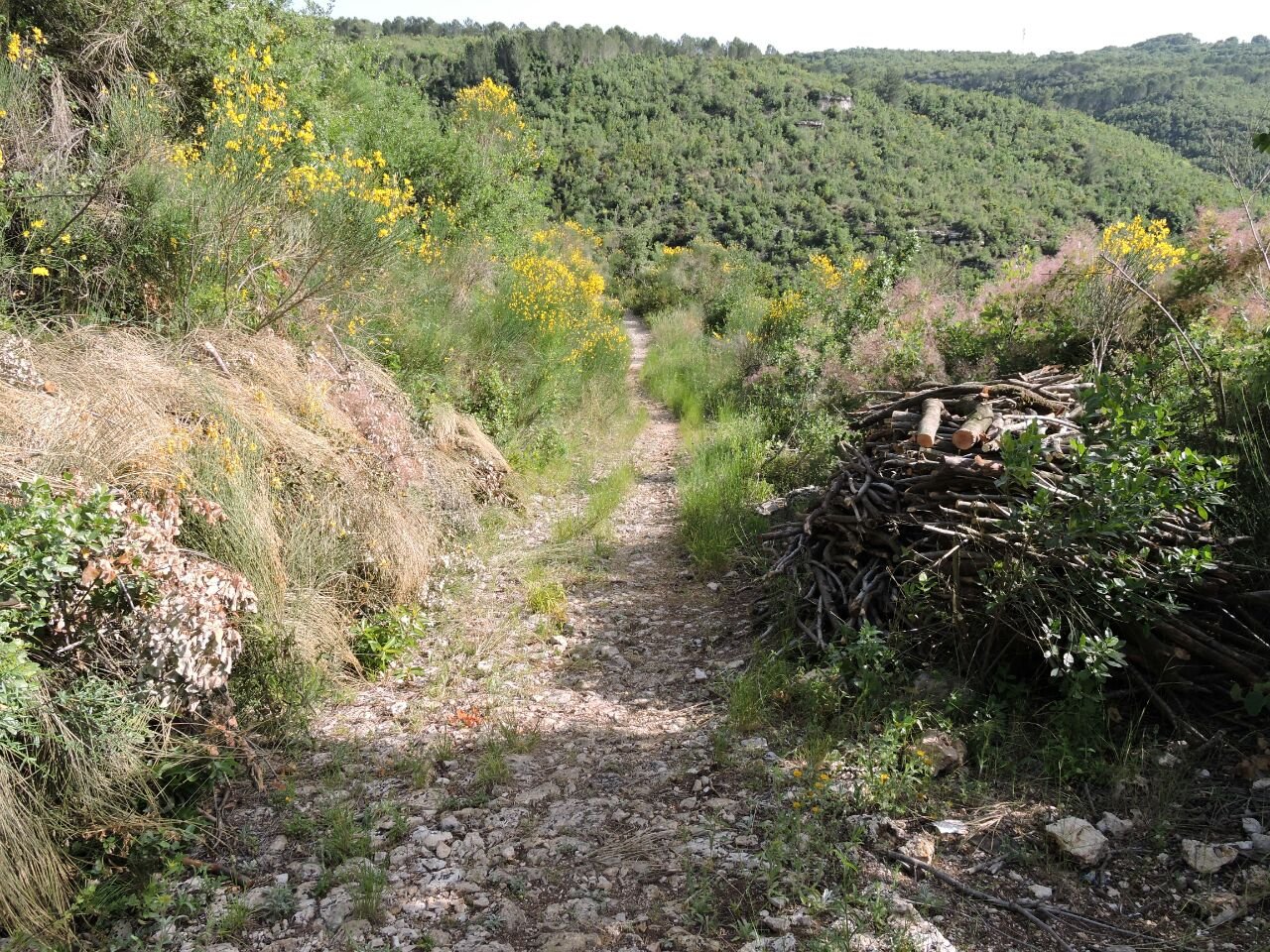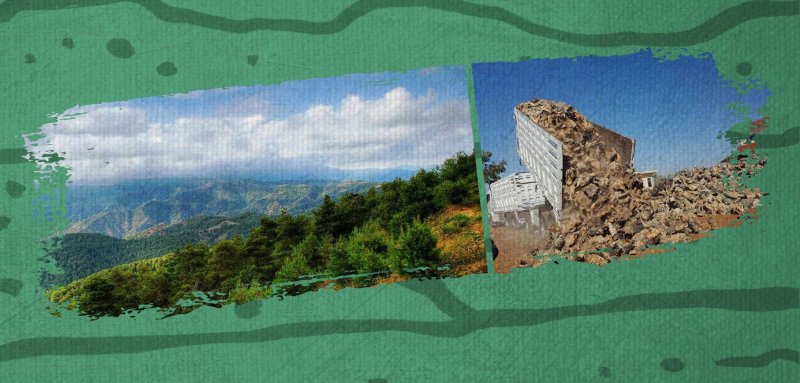Before declaring his "environmental" repentance, as he likes to call it with a smile, Irfan Haidar, 35, used to head to the forests surrounding his village in the town of al-Qadmus in Syria's Tartus Governorate, where he would choose the right oak branches to put in his own 'charcoal pile' and turn them into the charcoal sought after by merchants.
Irfan does not deny that he has made mistakes against the forest he loves, but it was the economic conditions that had pushed him to enter this line of work and benefit from the good income it provides, which would sometimes reach up to 400 US dollars per month in the past years, but this figure has decreased significantly recently.
Environmentalists in Syria are sounding the alarm about the dangers of logging, as it has become a trade business that the so-called market whales have become involved in.
During his work cutting and charring wood, the man was very careful and keen on preventing fires from spreading in neighboring areas. He was also constantly seeking to find a new job. As soon as he found one, he left this profession, and decided to devote part of his time to the environment, trying to spread awareness about it and on ways to preserve it.
The economic situation that prompted Irfan to enter this line of work is the same that prompted the majority of young people in areas near the forests to do so. Ahmad Hassan, 18, says that he failed high school because he was involved with his father's work in logging, which was the only source of income for them, and working in this field needs a lot of time and physical effort.
A wooden dome to produce charcoal
A "charcoal pile" is the place where charcoal is created, and it is more like a wooden dome made of branches. To build it, some strong branches are inserted into the ground and the rest of the branches are arranged around them, and then stones are placed all around the wood for support. A metal tube is then inserted inside, through which the spark "embers" are passed to begin the process of igniting the wood. After the construction is completed, the remnants of the leaves from the branches are placed on top to isolate the charcoal pile from the external climate, and some flat metal plates and a layer of soil are then added for insulation as well.
As for the mechanism of work, it is based on inserting some pre-ignited coal embers through the metal tube, to begin the charring process, which usually lasts about ten days. The basis of charcoal making is the slow burning of firewood over the heat of the embers without igniting an actual fire. In the end, everything that is placed on top of the charcoal pile is removed and sprayed with some water, and the charcoal is not pulled out immediately but rather left for two more days.

Logging and coal-making in the forests along the Syrian coast – a Raseef22 exclusive report
"The loggers' favorite"
Environmentalists in Syria are sounding the alarm about the dangers of logging, as it has become a trade business that the so-called market whales have become involved in, and everyone wants more, even if at the expense of the forest.
Speaking to Raseef22, environmental researcher Iyad al-Saleem explains that oak trees are a favorite of loggers, because they burn longer than other species of trees and last longer as coal embers before turning into ashes. Also, getting firewood from them requires less effort and they have more weight because of their density, and therefore results in higher profit for traders.
The problem is that oak trees bear fruit to nuts called “acorns” or oak nuts, which are the primary food source for many wild animals and woodland creatures. Field mice depend on it for 95% of their daily nourishment, and these field mice are the food source of carnivores such as wolves, jackals, foxes, wild cats, and others by 90%.
Saleem regularly posts on his Facebook page to warn of the dangers of continuing to cut down trees. He says, "In Tartus Governorate, with the exception of the Azari oak forests on the outskirts of Hama Governorate, statistics that we have worked on as environmental activists say that 90% of its trees have been cut down in recent years, and there is no doubt that this logging is continuing."
Oak trees are a favorite for loggers, because they burn longer than other species of trees and last longer as coal embers. Getting firewood from them requires less effort and they are heavier because of their density, thus resulting in higher profit for traders
This means, as Saleem explains, that the availability of oak nuts has decreased by 90%, and perhaps the numbers of field mice in the forests have decreased in the same proportion. This is what has been — and still is — exterminating animals that directly depend on eating oak fruits, such as squirrels, ferrets, mice, and others. And let’s not forget the birds that depend on forestry products and their fruits, such as arbutus, safflower, peapod, basil, and others. Even the flocks of migratory birds coming to stay in Syria for several months, will surely leave and carry on their way to other countries when they do not find enough food for them.
In Saleem's opinion, the solution first begins on an individual level. Loggers can choose to show some mercy when it comes to oak trees, and give them respite by taking firewood from other trees, even if it requires more effort for them. Even 'hookah' smokers can contribute by rejecting the charcoal made from oak trees, and asking for charcoal made from other types of trees. The issue has come down to choosing the lesser of two evils, since the death of oak trees in particular means the death of a large group of animals that depend on them, both directly and indirectly.

Logging in the forests along the Syrian coast – a Raseef22 exclusive report
Environmental and human hazards
An environmental activist tells Raseef22 that the problem of charcoal-making is that it is an illegal profession, and it may be one of the leading causes of forest fires, because those who char wood usually do so in remote and difficult-to-reach places so as not to be caught. And they sometimes leave the wood in the charcoal pile until the charring process ends. The problem with that is the possibility of the wind blowing and causing sparks to fly from the lit wood.
Aside from the environmental damages incurred by cutting down trees that may be decades old, there is a danger to workers in this line of work, which have become almost like “gangs”. Children or young boys are often employed in this profession, and work in unsafe conditions, be it in the stage of logging or making charcoal. Cases have been recorded of people who cut their hands while working or those who have developed acute respiratory diseases.
Solutions must be implemented through participatory management of the place, and building a good relationship with the forest
In the opinion of the activist, who preferred to remain anonymous, solutions must be made through the participatory management of the place and building a good relationship with the forest, since a person must feel connected with the place and his right to benefit from it. And this right is guaranteed by the law but sometimes isn't accurately applied.
This right is further confirmed by engineer Bilal Ibrahim, supervisor of the Al-Shuh (Fir) and Cedar Natural Reserve. Speaking to Raseef22, he explains that the residents near the forest have been benefiting from the forest for a long time, but never caused harm. Most of them only took what they needed by cutting down dry, weak, and sick trees, but now in some places, traders have begun to draw excessive quantities of firewood, which has led to the depletion of forests, especially the oak trees in all their varieties.
Ibrahim continues, "Unfortunately, the logging process, in addition to the fact that it consumes a large number of trees, is being practiced unethically. Many cut down the entire tree for ease of access and work, even though merely pruning it can give them the required timber and leaves, and would preserve the tree at the same time, especially since logging carried out within specific frameworks is beneficial to the forest. This work is carried out by the Forestry Management and Organization project of the Ministry of Agriculture. But in reality, those who work in logging tend to choose places that suffer from security disturbances and are adjacent to conflict zones, and work late at night. This makes it difficult to regulate and control them, especially since the conditions of the bodies responsible for forest control are not very ideal, since they suffer from a shortage of rangers and supplies, and they need vehicles and fuel to facilitate their work".
Charcoal-making is an illegal profession and may be one of the leading causes of forest fires, because those who char wood usually do so in remote and difficult-to-reach places so as not to be caught. There, the wind may blow and cause sparks to fly from the lit wood
Legal restrictions and permitted investments
Syrian law prohibits the depletion and unjust exploitation of forests. It also punishes the crimes of damaging crops and cutting down trees, some of which are stipulated in the Penal Code while others are stipulated in the Forestry Law No. 6 of 2018.
According to the second law, anyone who, without prior authorization, uproots, cuts, damages, or mutilates trees and shrubs in the state’s forests or commits any action that leads to their destruction, shall be punished by imprisonment from six months to two years and must pay a fine of 500 thousand to one million Syrian pounds (between 110 and 220 US dollars, depending on the exchange rate in the parallel market). Anyone who removes, takes, or transports soil, weeds, dry or green leaves, or natural fertilizers found in state forests shall be punished by imprisonment from three months to one year and pay a fine of 100 thousand to 200 thousand Syrian pounds.
As for the Penal Code, Article 725 stipulates that anyone who cuts, breaks, or damages existing plants, trees, or shrubs that grow in nature or by humans, or even other plants that belong to others, shall be punished by imprisonment from three months to two years and pay a fine of 100 to 500 Syrian pounds (only 11 cents).
Article 726 stipulates that if the act of destruction is committed on natural places of feeding, fruit trees, their shoots, or on any type of tree that is valuable from an agricultural, commercial, or industrial standpoint, the offender shall be punished by a fine of 100 to 300 Syrian pounds and by imprisonment from ten days to a month for each fruit, tree, or shoot, provided that the total penalties do not exceed three years.

Logging in the forests along the Syrian coast – a Raseef22 exclusive report
Despite these restrictions, there are permissible acts that are not punished by law and may even be encouraged. Engineer Ibrahim explains that according to the Forestry Law, the residents living near forests are allowed to benefit from them with official licenses. They are allowed to have their cattle graze within a specific capacity, collect medicinal and aromatic plants, and are allowed to establish eco-tourism facilities that comply with the conditions set by the Forestry Law and portable facilities that are to be removed upon the expiration of the investment period.
As for forests that have been exposed to fire (and are at constant risk of fire), either the burned firewood is removed by teams and groups affiliated with the Ministry of Agriculture, or they are put up for investment in public auction. This work is under the supervision of the Ministry of Agriculture, and in case the investor wishes to make charcoal out of the burnt wood, he needs a special charcoal-making license that would be granted by the ministry only if the conditions stipulated in the Forestry Law are met.
Raseef22 is a not for profit entity. Our focus is on quality journalism. Every contribution to the NasRaseef membership goes directly towards journalism production. We stand independent, not accepting corporate sponsorships, sponsored content or political funding.
Support our mission to keep Raseef22 available to all readers by clicking here!
Interested in writing with us? Check our pitch process here!





